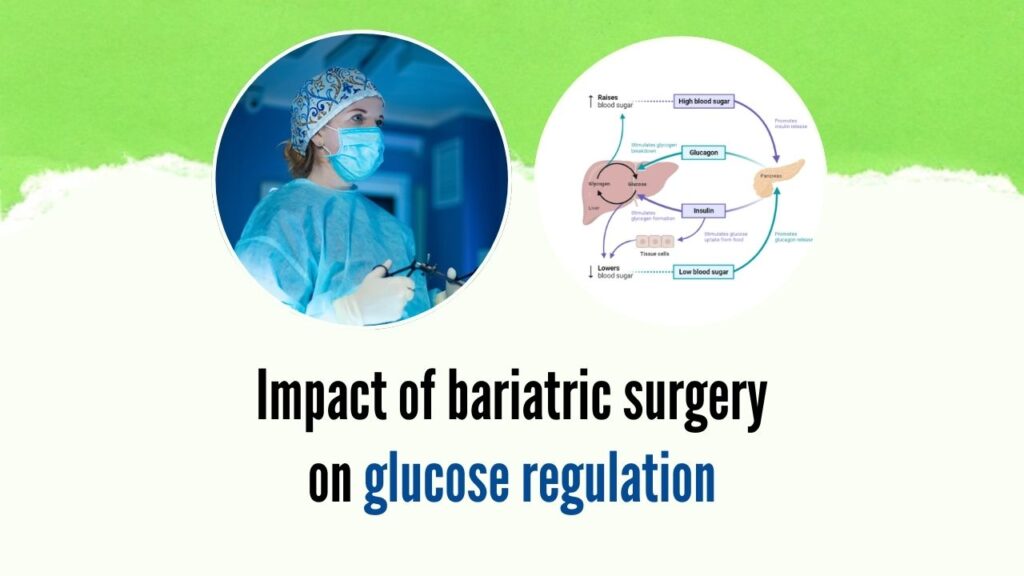Impact of Bariatric Surgery on Glucose Regulation

Diabetes is characterised by high blood sugar levels and resistance to insulin . While medication and lifestyle changes are commonly used to manage diabetes, bariatric surgery has emerged as an effective strategy for treating and even reversing the disease. Bariatric surgery is performed when diet and exercise have failed to improve a person’s health. Weight loss surgery is another name for it. Individuals with a BMI more than 30 or metabolic problems such as diabetes or heart disease are ideal candidates for bariatric surgery. There are different types of Bariatric Surgery but commonly performed are laparoscopic sleeve gastrectomy, mini gastric bypass, and gastric bypass surgery.
The mechanisms by which bariatric surgery impacts glucose control are complicated and involve a number of interconnected components.
Here are some important mechanisms:
Weight Loss: Bariatric surgery causes large and long-term weight loss, which is important for glucose management. Excess weight contributes to insulin resistance, a condition in which cells become less sensitive to insulin, resulting in high blood glucose levels. Bariatric surgery helps restore insulin sensitivity by lowering body weight, allowing cells to effectively use glucose.
Changes in Gut Hormones: Bariatric surgery treatments like gastric bypass and sleeve gastrectomy affect the structure of the digestive tract, causing changes in the production and signalling of particular gut hormones. These hormones influence glucose metabolism directly. They improve managing blood sugar by increasing insulin secretion, delaying stomach emptying, decreasing hunger, and promoting satiety.
Increased Insulin Secretion: Pancreatic insulin secretion is increased post Bariatric surgery . In surgeries such as gastric bypass, in which food is bypassed via a section of the stomach and small intestine this impact is noticeable .There is an increase in insulin release in response to meal consumption which enhances glucose absorption by cells because of changes in gastrointestinal structure .
Alterations in Gut Microbiome: It has been found that bariatric surgery alters the composition as well as the diversity of the gut microbiota , the population of bacteria that live in the digestive system . Better glucose management has been associated with these modifications . Insulin sensitivity and glucose metabolism is altered by Short- chain fatty acids (SCFAs) which are produced by some gut bacteria .Beneficial alterations in short-chain fatty acids post – surgery can lead to improved glucose production.
5) Minimised Inflammatory Response – Obesity is connected with an ongoing
condition of low-grade inflammation that can interfere with insulin
signalling and glucose regulation .
Post Bariatric surgery Systemic inflammation indicators including C-reactive
protein (CRP) and pro – inflammatory cytokines have been proven to be
reduced . Insulin sensitivity and glucose metabolism is potentially increased
due to decrease in inflammation .
Identifying the Signs of Malnutrition
As soon as you observe or suspect any of these signs, it is advised to take immediate medical attention. The earlier these deficiencies are detected, the more favourable the outcome.
Lack of protein leads to muscle loss, lethargy, and fatigue. Protein deficiency also leads to a big appetite and thus it is important to incorporate protein rich food in your daily meal.
When the body isn’t getting enough vitamins, we experience fatigue, weakness, etc. to resolve these problems supplements that are prescription strength, protein shakes, or other supplemental drinks that are high in nutrients may be added to the diet by the doctor or nutritionist.
Depending upon the type of bariatric surgery technique it is necessary to know that specific mechanisms might differ . The overall impact of bariatric surgery on glucose management can be potentially influenced by individual patient factors such as glucose control and the existence of other metabolic disorders .
Aastha Bariatrics offers a thorough approach to bariatric surgery as a centre of expertise. It is a well-known facility with a focus on metabolic and bariatric surgery. The foremost metabolic and bariatric surgeon is Dr. Manish Motwani. Aastha Bariatrics provides a group of medical specialists that cooperate with patients to help them meet their weight reduction and health objectives.
Read also; The Cost of Bariatric Surgery in India
Why We Are?
- Asia's Trusted Bariatric Center
- Centre of Excellence
- Patient Trusted Highly Volume Bariatric Center in Mumbai
- EMI, Cashless & Mediclaim Facilities are Available
- Daily Patients Follow-up after Bariatric Surgery
- Patient Support Group Every Month
- Obesity Awareness Program
- Available with Latest Technologies
- 18+ Experience in Weight Loss Bariatric Surgery
- 300+ Weight Loss Diet Plan & Recipes
- Highly Trained & Experienced Bariatric Nutritionist
- Patient WhatsApp Chat Group
- & Many More
Medically reviewed by Dr. Manish Motwani, Bariatric & Metabolic Laparoscopic Bariatric Surgeon — Curated by Mishitha








